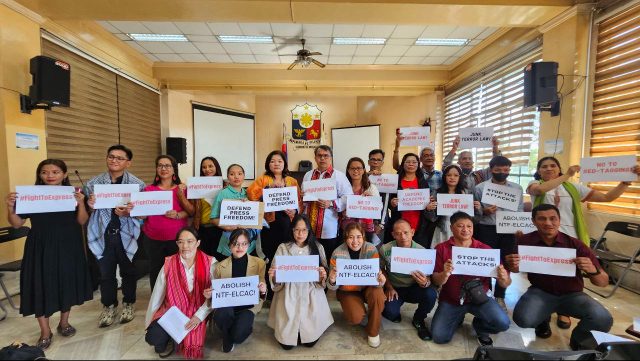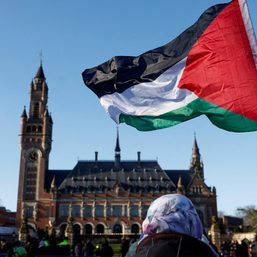SUMMARY
This is AI generated summarization, which may have errors. For context, always refer to the full article.

BAGUIO CITY – The Baguio City Council and civil society organizations (CSOs) North of Manila expressed concern about incidents of red-tagging and the dangers it posed to victims during the visit of Irene Khan, the United Nations Special Rapporteur on the freedom of expression and opinion in the city on Friday, January 26.
In a letter of concern, they said that despite Baguio’s steps to fulfill its human rights obligation, city council members also fell victim to “red-tagging and disinformation.” Vice Mayor Faustino Olowan and nine councilors signed the submission.
They cited incidents in which Mayor Benjamin Magalong and councilors Jose Molintas and Arthur Allad-iw were accused of supporting and having links with communist rebels.
“The impact of these on our roles as duty bearers are not as daunting as those of our constituents directly targeted with red-tagging and disinformation,” the city council said.
“However, this brings to light the need for policy review from the local to the national level regarding respect for freedom of expression, freedom of association, and the people’s right to dissent,” they added.
The city council recommended that perpetrators of red-tagging and political vilification be held accountable. They also said the UN should extend technical support for protection and mechanisms to address disinformation on the internet.
The country’s Summer Capital was one of the stops on Khan’s 10-day official visit, which started on January 23. The UN expert met with city officials, the prosecutors’ office, and the executive judges and magistrates from the municipal and regional trial courts.
In an interview with the Baguio press, lawyer Jyro Go of the Presidential Task Force on Media Security said Khan’s discussion with the prosecutors and judges revealed that most cases in the city do not involve matters of freedom of expression and opinion.
“Mostly, we have land cases and white-collared crimes. But freedom of expression here is very vibrant, as expounded by the judges and the fiscal,” he said in mixed Filipino and English.
Khan also met with CSOs from North and Central Luzon and listen to their concerns and testimonies.
Common issue
Red tagging is a common issue the media and CSOs raised during their meeting with Khan in the Baguio City Council Session Hall, belying Philippine authorities’ statements that the practice is not a state policy.
Edward Kuan, secretary of La Union fisherfolk group Timek, said several of their leaders and members are now afraid to voice their concerns and participate in activities for fear of being branded communist supporters.
“We are afraid that speaking about our situation and informing the public and your office about our issues and concerns would put us at greater risk and result in more rights violations,” he said in Ilokano.
Meanwhile, the Baguio urban poor group Ornus shared the anxiety from unwanted visits and privacy breaches under the Dumanon Makitongtong (Visit and Talk).
An adoption of the Duterte government’s anti-illegal drug campaign Tokhang, the tactics involve law enforcement visiting “known members of the communist front organizations in order to persuade them to stop dealing with or supporting the CPP-NPA-NDF.”
In Central Luzon, Alberto Roldan of the fisherfolk group Pamalakaya said that they are being vilified and accused of being communist sympathizers for being outspoken and critical about government policies.
Press intimidation
Meanwhile, reports from Baguio journalists disproved the government’s statement that there is no systematic attack against the press.
Maria Elena Catajan, National Union of Journalists of the Philippines Baguio-Benguet secretary, said the passage of the Anti-Terrorism law and designation of the Communist Party of the Philippines and New People’s Army as terrorists “further exposed red-tagged individuals to greater risk.”
“It is a form of intimidation, targeting journalists and outfits that critically report on government officials, programs, and policies. Aside from the danger, red tagging intends to discredit the press and diminish the credibility of our reports,” she added.
In her report, Northern Dispatch editor Kimberlie Quitasol outlined cases that positively linked state actors as perpetrators. She cited the Commission on Human Rights investigation of three incidents targeting Nordis editors and staff, which concluded that police and military are responsible.
The Nordis editor further said: “Another case in August 2022 established possible links with the military. In all cases, CHR ruled that our right to life, security, and freedom of expression and opinion were violated.”
She provided Khan copies of the resolutions and urged her to “consider conducting a deeper probe into red-tagging against journalists.” – Rappler.com
Add a comment
How does this make you feel?










There are no comments yet. Add your comment to start the conversation.